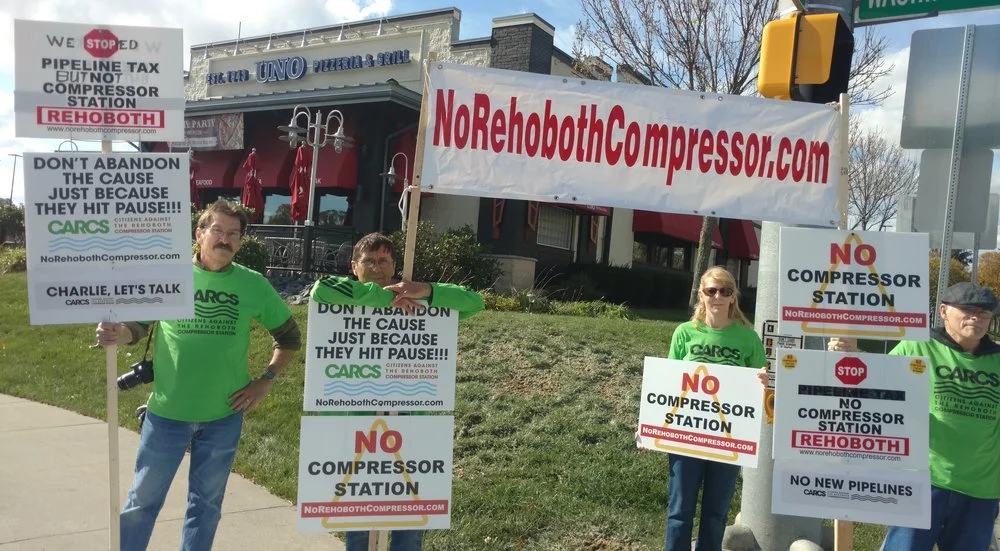
Tim Faulkner: Gov. Baker still won't oppose natural-gas projects
Opponents of a proposed natural-gas pipeline compressor station recently protested outside a local restaurant, where Gov. Charlie Baker stumped for Attleboro's mayor.
-- Photo by Tim Faulkner for ecoRI News
Via ecoRI News (ecori.org)
ATTLEBORO, Mass.
Even though Spectra Energy Partners has withdrawn plans for a natural-gas pipeline compressor station in Rehoboth, Mass., opponents of the project don’t want it coming back.
Groups such as Citizens Against the Rehoboth Compressor Station (CARCS) have been pleading with Gov. Charlie Baker to take a stand against the compressor station and other pipeline expansions, but so far the governor has refused to bend to public pressure and oppose the natural-gas infrastructure projects proposed for the region.
CARCS activists protested Oct. 28 outside the Uno's Pizzeria & Grill on Route 1, where Baker stumped for local politicians. Baker arrived late and didn't address the demonstrators, including members of the MBTA bus maintenance union who were protesting Baker’s efforts to privatize their jobs.
The International Association of Machinists Union Local 264 protested Baker's efforts to privatize their jobs.
Attleboro Mayor Kevin Dumas was one of the politicians whom Baker has endorsed. Dumas, however, opposes the compressor project. “It’s dead and I hope it stays dead,” Dumas told ecoRI News.
Dumas, a Republican, has been an outspoken critic of the compressor station and signed a resolution opposing the project, the proposed site close to the city’s border with Rehoboth.
Baker has only said that the project is a federal decision and outside of state control. But opponents such as Brian Hatch, a lawyer from Attleboro, said Baker could do more to impede or even stop the compressor station. Recent appeals court decisions, he said, give states more say in the permitting of energy projects that are under the purview of the Federal Energy Regulatory Commission.
The site of the proposed compressor station poses a health threat to residential neighborhoods and youth who frequent the nearby park and athletic fields, Hatch said.
Kathleen Boivin of Rehoboth referred to a 2015 report by Attorney General Maura Healey showing that the growth of renewable energy and energy-efficiency improvements reduce the demand for natural gas and therefore pipeline enhancements.
Boivin said the common belief about the buildout of the Spectra pipeline isn't to provide natural gas for New England but to deliver it to export terminals north of Boston.
“There’s no need for our communities to bear the health, environmental, and financial detrimental effects of this additional infrastructure when it’s not needed,” she said.
Last week CARCS members also hand-delivered a petition signed by 2,500 opponents of the compressor to Baker’s office in Boston.
CARCS Director Tracy Manzella said after 19 months of organized opposition Baker hasn't budged.
“We’ve gone door to door, staged countless community events, sponsored letter-writing campaigns, given interviews, published articles, met with local, state, and federal government officials, drafted bylaws, and even given a Powerpoint presentation at the governor’s executive office of Energy and Environmental Affairs, but the governor himself? So far, no luck.”
The proposed 10,320-horsepower Rehoboth compressor station was halted by Houston-based Spectrain June. The project was one of several Access Northeast projects paused along the Algonquin pipeline. The compressor station was proposed for a privately owned, 120-acre site close to Attleboro and Seekonk, and Pawtucket, R.I., and about 10 miles from downtown Providence.
The projects were withdrawn because of financing trouble, created when the Massachusetts Supreme Judicial Court ruled that a plan by National Grid and Eversource to charge electricity customers for the projects was unconstitutional. It’s expected that Spectra, National Grid, and Eversource will revive the projects if a new funding scheme is approved.
Tim Faulkner is reporter/writer for ecoRI News.
Tim Faulkner: Southern New England gas-pipeline project suspended
The Access Northeast project
-- Map by Access Northeast
Via ecoRI News (ecori.org)
A natural-gas-infrastructure project slated for southern New England came to a screeching halt June 29, when Houston-based Spectra Energy Partners announced it is suspending the controversial Access Northeast project.
The buildout of the Algonquin natural-gas pipeline centered on a series of extensions and nine compressor station projects between New York and Massachusetts, including a new compressor station in Rehoboth, Mass., and the expansion of a compressor station in Burrillville, R.I.
The 10,320-horsepower Rehoboth compressor station was proposed for a privately owned 120-acre site close to Attleboro and Seekonk, Mass., and Pawtucket, R.I., and about 10 miles from downtown Providence.
Access Northeast was a shared effort by Spectra, National Grid and Eversource. The project was one of several that resulted from a December 2013 agreement between all six New England governors that allowed the states to share the costs of regional energy projects. The effort hit a snag in late 2016, when the Massachusetts Supreme Judicial Court rejected a plan by the three companies to charge electric ratepayers for the natural-gas projects. The demise of the so-called “pipeline tax" put the Access Northeast and other proposed pipeline upgrades in limbo and prompted other New England states to suspend or reject similar funding schemes.
The Access Northeast project provoked stiff local criticism and the formation of opposition groups such as Citizens Against the Rehoboth Compressor Station (CARCS), The FANG Collective and Burrillville Against Spectra Energy.
Opponents united over heath, safety and environmental risks such as air and water pollution, fires and explosions, noise, climate-change impacts, and the notion that the projects helped the export of natural gas from hydraulic fracturing fields in Pennsylvania and Ohio to coastal terminals in or near New England.
News of the canceled project was announced via an e-mail to municipalities hosting projects. The opposition groups were quick to responded to the announcement that Spectra withdraw the Access Northeast application.
“This victory is owed to all of the frontline communities who have been resisting Spectra across the Northeast, and to those who have put their bodies on the line as part of direct actions to stop Spectra," said Nick Katkevich of The FANG Collective, a Providence-based environmental activist group that was founded in reaction to a previous expansion of the Burrillville compressor station.
Katkevich and other activists say there are still many more southern New England projects to oppose, such as Spectra’s Atlantic Bridge project, which includes a bitterly contested compressor station in Weymouth, Mass.
“We must remain ever vigilant since Rehoboth hosts miles of transmission lines which makes us particularly vulnerable,” said Tracy Manzella of CARCS. “We agree and support the messaging from all the other anti-pipeline groups."
Manzella sees bigger forces to reckon with, such as fossil-fuel-friendly policies advanced by the operator of the New England power grid, ISO New England, and Massachusetts Gov. Charlie Baker.
“CARCS will not rest in its resistance to pipeline expansion here or anywhere, not until we have safely made the transition to clean renewable energy and the window of opportunity for these greedy companies to use us for their profit taking is past," she said.
Access Northeast is the second canceled pipeline project. In March 2016, fossil-fuel developer and pipeline owner Kinder Morgan scrapped its proposed $3 billion, 188-mile Northeast Direct pipeline planned for the northern edge of Massachusetts.
“Spectra recognized that their deep pockets were no match for grassroots power," said Craig Altemose, executive director for 350 Massachusetts for a Better Future. "It’s only a matter of time before other fossil-fuel companies come to the same realization. We look forward to Spectra similarly abandoning their plans for the similarly offensive and unnecessary Atlantic Bridge project.”
Tim Faulkner writes frequently for eco RI News.


